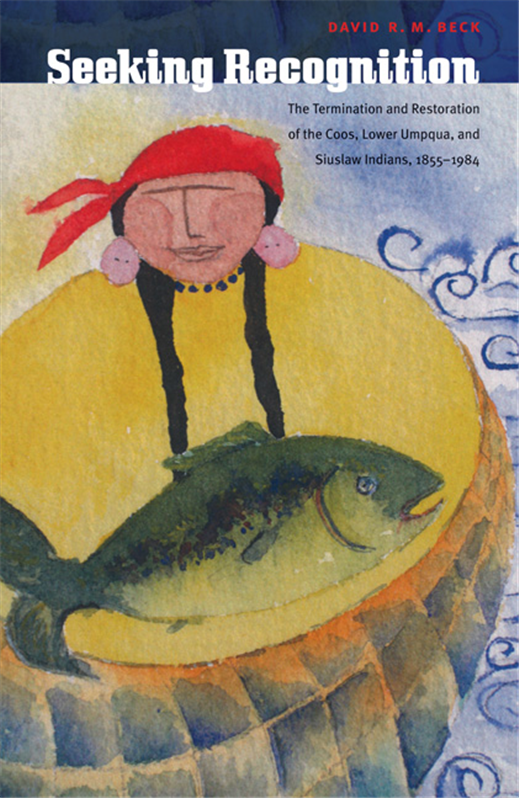Seeking Recognition
In 1855 the Coos, Lower Umpqua, and Siuslaw tribes of Oregon signed the Empire Treaty with the United States, which would have provided them rights as federally acknowledged tribes with formal relationships with the U.S. government. The treaty, however, was never ratified by Congress; in fact, the federal government lost the document. Tribal leaders spent the next century battling to overcome their quasi-recognized status, receiving some federal services for Indians but no compensation for the land and resources they lost. In 1956 the U.S. government officially terminated their tribal status as part of a national effort to eliminate the government’s relationship with Indian tribes. These tribes vehemently opposed termination yet were not consulted in this action.
In Seeking Recognition, David R. M. Beck examines the termination and eventual restoration of the Confederated Tribes at Coos, Lower Umpqua, and Siuslaw some thirty years later, in 1984. Within this historical context, the termination and restoration of the tribes take on new significance. These actions did not take place in a historical vacuum but were directly connected with the history of the tribe’s efforts to gain U.S. government recognition from the very beginning of their relations.
Praise for Seeking Recognition
“Beck’s careful archival research, coupled with field notes and interviews, demonstrate how stalwart, unceasing resistance efforts, organization, and persistence (130 years between the original treaty and recognition in 1985) eventually led to victory. This kind of close historical scholarship serves to amend a record that often presents Indian people as victims rather than as powerful initiators and participants in a restorative justice process.”—L. De Danaan, Choice
“[Seeking Recognition] is a valuable source for people interested in Indian termination policy, Oregon history, and in the history of race relations generally in the United States. The Coos, Lower Umpqua, and Siuslaw finally have received the recognition unfairly denied to them over the last one hundred and fifty years.”—Nicholas C. Peroff, American Historical Review
“Drawing on an impressive range of archival materials, secondary sources, and interviews with Coos, Lower Umpqua, and Siuslaw who resisted termination and demanded restoration, Beck’s fine book adds to our understanding of the termination era and of American Indian’s efforts to maintain their culture and their community in the twentieth century.”—Paul C. Rosier, Ethnohistory
“Tribal members will find their own voices and family stories interspersed throughout Beck’s narrative. Indian perspectives and local knowledge bring this historical policy analysis to life.”—Gray H. Whaley, Pacific Historical Review
“Using oral history to plug gaps in the written record and to convey Native perspectives, Beck offers a fuller view of the forces that shaped federal policy and a more complex picture of tribal responses to it.”—Andrew H. Fisher, Wicazo Sa
“David R. M. Beck has made a major contribution by examining the disaggregated communities of the Oregon Coast between the Siletz and Coquille Rivers—known today as the Confederated Tribes of the Coos, Lower Umpqua, and Siuslaw.”—R. Warren Metcalf, Western Historical Quarterly
“Beck's work on behalf of the Coos, Lower Umpqua, and Siuslaw of southwestern Oregon is a tour de force of ethnohistorical research.”—David Martínez, author of Life of the Indigenous Mind: Vine Deloria Jr and the Birth of the Red Power Movement
“Dr. Beck wrote a very well documented history of the Coos, Lower Umpqua and Siuslaw Indians who survived against attempted genocide of their people. No doubt, this true story mirrors what happened to the Native Americans throughout this country and to Indigenes throughout the world. Dr. Beck does a superb job of relating historically how these magnificent people began to pull together against impossible odds, how they worked to re-construct their culture, and to restore their Tribes. Being a long-standing resident of a coastal town in Oregon called Yachats, I came to know of this area’s bleak history, when 150 years ago, the Alsea Sub-agency was established. The Coos and Lower Umpqua were forcibly marched to this isolated spot. Many died of starvation, exposure, disease and abuse. This book is both a testament that we all must learn and never forget what happened to these people, and to applaud their courage, perseverance and grace. An interesting coincidence is that the 2009 publication of Dr. Beck’s book is the same year that the Confederated Tribes of the Coos, Lower Umpqua and Siuslaw Indians’ celebrated the 25th anniversary of their restoration. For those of you who travel through Yachats, I ask you to pay respect to and honor the Alsea, Siuslaw, Lower Umpqua and Coos people who lost their lives as a result of their forced incarceration and mistreatment in Yachats, Waldport and Florence areas. The Amanda Trail that connects Yachats to Cape Perpetua is a spiritual and solemn path that remembers in perpetuity.”—Joanne Kittel
